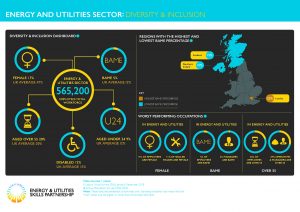What is ‘Human Capital’?
According to the OECD, human capital is defined as “the knowledge, skills, competencies and other attributes embodied in individuals or groups of individuals acquired during their life and used to produce goods, services or ideas in market circumstances”.
The Need for Action
The importance of building human capital in the UK utilities is growing in its understanding. Simply put, human capital – people – remains at the core of modern business. They include the employees, suppliers, distributors and retailers. The Social & Human Capital Coalition is a global multi-stakeholder collaboration that brings together leading initiatives and organizations to help companies recognise, measure and value the importance of people and communities.
White Paper
In 2017, in partnership with SSE, we published a Whitepaper entitled ‘is enough value placed on human capital?’.
You can read the white paper here.
Consultations
Welsh Apprenticeship Frameworks consultation – ends 9 December
As mentioned in our recent ‘Member Insight’, this consultation on the structure of Welsh Apprenticeship Frameworks and supporting pathways will close on 9th December 2019.
Welsh Government is focusing on building and improving its apprenticeship offer in order to grow its economy, in the wider context of its National Strategy. This consultation aims to propose a new, simplified structure for apprenticeship frameworks in Wales, based on clear occupational sectors and pathways. It also seeks to ensure that current frameworks are fit for purpose.
This proposal sets out the proposed framework architecture of 23 occupational sectors; and the 72 occupational pathways supporting the sectors. It also provides a comparison of the proposed occupational sectors and occupational pathways with the T level routes and pathways adopted in England and a list of the current frameworks with the number of starts for the 3 academic years between 2015/16 and 2017/18. The outcome of the consultation will inform the future architecture of apprenticeships in Wales.
The energy and utilities sector is mainly included within the proposed ‘Engineering’ and ‘Energy’ occupational sectors, which map to the English Engineering and Manufacturing T level route.
We would be interested to hear employer views on these proposals. If your organisation wishes to participate in a sector response, please contact grace.storey@euskills.co.uk by 18th November.
ONS consultation on valuing UK human capital – ends 11 November
In the 2018 Spring Statement, the Chancellor of the Exchequer asked the ONS to develop a more sophisticated measure of human capital. In addition, there has been growing UK user interest to better understand wider impacts to improve sustainable growth in the economy and the impact on the individual.
These focus on:
- Understanding skills gaps and the threats of automation across all sectors of the economy;
- The value for money of education and training, from vocational and higher education to apprenticeships and job-related training;
- Producing international comparable estimates of human capital.
There are also international efforts to develop comparable human capital estimates for policy, from work the OECD is doing on productivity to efforts from the World Bank to develop a human capital index, and ONS is engaging with international efforts on this topic, which feed into this consultation as well as wider work.
Energy & Utility Skills has submitted its consultation response to the Office of National Statistics (ONS). To find out more, click here.
Sector Profiles
New UK Utility Sector Workforce Profiles
These industry profiles contain a wide range of indicators relating to the energy and utilities’ workforce – from the size and personal characteristics of the people that work in the sector, through to current and predicted skills challenges and planned infrastructure investment. There are seven profiles to choose from – one for the energy and utilities sector as a whole and one for each of its constituent industries (including the contractor community).
To view the sector and industry infographics click here.
Policy
The UK’s future immigration system
If the UK leaves the EU the current government plans to implement a new, unified immigration system, which will apply to all people who come to the UK. They intend to implement the future immigration system from 1 January 2021. With policy makers now going in to purdah, this briefing document from the House of Commons Library sets out what is known about the current proposals for the future immigration system. The document states:
“Because immigration alone is not the answer. Rather than automatically relying on low-skilled labour from abroad, our new approach means British businesses will have to back our people. They must invest in training, technology and to increase domestic skill levels”.
Industrial Strategy Commission…2 Years On
While employment, immigration and workforce policy is centralised, the subject of ‘skills’ keeps being devolved. This week is the second anniversary of the Industrial Strategy Commission report. They advised that the productivity of every company in the country, and the standard of living of every individual, is affected by the quality of the infrastructure that people and businesses can access. Infrastructure should be thought of in terms of assets of all kinds, physical, natural and human; it is not just concrete or even fibre, but includes human capital.
Too often skills is created as a freestanding system with few connections.
Skills policy requires institutional and policy stability after decades of damaging instability. Cross-party consensus on supporting the framework adopted in the coming years will be critical to its success. To deliver both local and national industrial strategy objectives, closer working and co-operation is required between the Department for Education and BEIS, national and local authorities, and the higher and further education funding and regulatory systems.
The Water UK Public Interest Commitment sets out to triple the rate of sector-wide leakage reduction by 2030 through an unprecedented rate of improvement.
Read the Public Interest Commitment
Westminster government and Ofwat have adopted a target of 50% reduction by 2050. The significant direct and – in particular – indirect labour force requirement will need forward planning and the demand will come at exactly the same time as similar mass requirements for level 1 and 2 workers arise for water, gas and power metering strategies, electric vehicle installations, implementing the English waste management strategy, UK telecoms companies upgrading to 5G, mass rail investment and significant energy infrastructure projects. To achieve the productivity needed, via a safe skilled and sustainable workforce, coordinated planning is needed from HM Treasury, environmental policy makers, regulators and water undertakers to optimise the labour market, build technical skills and give the major contractors and supply chain time to plan and invest. Every litre of water within that leakage asset strategy is also a food grade product with public trust built in to every drop. Its time right now to start collaborating.
Valuing Human Capital
Investors seek human capital
The Workforce Disclosure Initiative, a coalition of institutional investors with combined assets of over $14 trillion, are renewing their call for companies to come forward with better data on their staff and supply chain workers. Investor signatories, coordinated by ShareAction, include Amundi, Legal and General IM, APG, Rockefeller & Co, Schroders, AMP Capital, PKA Denmark, BMO Global Asset Management and First State Super. The signatories want companies to disclose more standardised data on their human assets and strategies. Many investors have drawn on WDI data to inform their company engagement, while some have started to incorporate data into stock analysis.
Elly Irving, Head of Engagement at Schroders, says:
“As a long-term investor we are trying to influence our investee companies to adopt more sustainable business practices. We’re making progress on a range of issues from climate change to cyber security, but still have little transparency on workforce issues. WDI is a valuable tool to help us improve our understanding of workforce risks and engage with companies to adopt emerging best practice.”
https://shareaction.org/wdi/signatories/
Human Capital Valuation
Integrated reporting has been on the rise for many larger companies, focused on the Six Capitals model. Too often the Human Capital aspect, offers only an internally focused report on basic HR practices, rather than considering the equity within the direct and indirect workforce, and the companies’ intellectual capital and corporate memory.
The early publications from Integrated Reporting set out clearly that;
“Financial capital has traditionally dominated economic models and business thinking. But in the modern world, where innovation and intellectual capital have become vital for organisations’ success, increasing attention is being paid to the value of human capital…Human capital is by its nature a highly variable resource, influenced by geography and culture, industry and organisation. The needs that organisations have of human capital also change over time as markets, technology and societies develop. Managing and reporting on human capital is challenging, but vital to help organisations create and maximize value”.
Case Studies from our Members
Pricing human capital and inclusion
As the Office of National Statistics consults on its approach to valuing human capital, SSE has continued to be in the vanguard of taking this business approach in to board level reporting.
SSE initially commissioned a ‘human capital’ report which measures the economic value of the skills and capabilities of the people it employs then produced an economic assessment with PWC and finally demonstrated the tangible business value of inclusion
Yorkshire Water
Yorkshire Water is building human capital – including intellectual capital – in to their decision making framework, which is a cross business process.
The major water company are monetising all costs and benefits through a ‘common currency’ following the business approach called the Six Capitals.
Yorkshire state “Financial accounting is one of the essential functions of nearly every organisation, allowing them to ensure that they have the necessary financial resources to continue operating. However, financial assets are not the only thing upon which an organisation depends. Physical resources, such as clean water, raw materials, energy and a skilled workforce; and non-physical resources such as reputation and knowledge, are equally vital to the continued existence of any organisation. However, these non-financial assets (both physical and non-physical) are rarely included in accounts and balance sheets. Similarly, an organisations’ impacts, positive and negative, on these non-fixed assets are rarely captured by conventional accounting and reporting processes. This can lead to sub-optimal decisions which are contributing to local and global sustainability challenges”.

